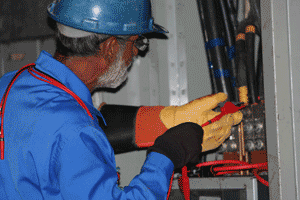ENERGY expenditure accounts for more than 30 percent of the average Guyanese company’s overheads in any given month. Guyanese manufacturers in almost every category of industry — whether metal work, food production, infrastructural and vehicle repairs, household artifacts or building accessories – have, for decades, struggled with astronomical power costs.
 The Business Support Organisation, the Guyana Manufacturing & Services Association (GMSA), has been relentlessly seeking out viable solutions to ensure that its members are not forced to close their doors in face of this reality.
The Business Support Organisation, the Guyana Manufacturing & Services Association (GMSA), has been relentlessly seeking out viable solutions to ensure that its members are not forced to close their doors in face of this reality.
Advocating at the highest levels for reductions and concessions for electricity costs from the national grid and the cost of fuel for power generators has been at the top of the Association’s agenda for quite some time.
GMSA found an answer in 2010, and crafted a finely defined strategy for better energy management for companies in the manufacturing and services sectors, to make the most efficient use of their installed applications, whether they receive power from the national grid or self-generate.
Simultaneously, those businesses would be guided to apply their most effective methods of conservation.
GMSA then approached the Multilateral Investment Fund (MIF) of the Inter-American Development Bank (IDB) for assistance with funding this Energy Efficiency Project.
The IDB approved the project in 2011, and the jointly-funded project (IDB 70%, GMSA 30%) was signed into being on 6th June last.
Five (5) member companies of the GMSA were selected to serve as pilots for the two-part project, the first of which involves a detailed energy ratings survey and baseline study on each company, being conducted by Jamaican Eaton Haughton, CEO/Owner of Caribbean ESCo Ltd. He is working in tandem with locally based electrical engineering firm Dynamic Engineering Company, which has recently ventured into energy conservation as a new service line.
Haughton is himself a high-profile energy consultant, renowned throughout the Caribbean Region. Over the past 25 years, he has completed or contributed to several internationally-funded projects for the governments and private sectors in Belize, The Bahamas, Jamaica, St. Lucia, Suriname, and St. Vincent and The Grenadines. He was instrumental in installing hospital solar water heating systems in Grenada, and implemented energy audits and energy services projects for the Petroleum Corporation of Jamaica (PCJ), and on the Mona Campus of the University of the West Indies.
More recently, in 2011, he completed an extensive energy audit at the Turkeyen ECD CARICOM Secretariat.
Haughton is currently visiting the pilot companies that are participating in the IDB/GMSA project, and will shortly commence the process of measuring power input and output on each location, besides assessing the viability and suitability of electrical installations in factories, workshops and offices.
He is examining each company’s systemic and operational energy demand for analysis against their needs. These will eventually be amalgamated with consumption patterns and costs, and factored into workable energy management formulas for each category of enterprise.
Since his arrival, Mr. Haughton has met with Prime Minister, Samuel Hinds, who holds ministerial responsibility for the energy sector, as well as with members of the project’s steering committee and key personnel within the companies participating in the project.
In a brief conversation, he stated emphatically that his primary thrust has always been to improve the efficiency of energy delivery and consumption ahead of capital investments for power from renewable sources.
“I may have some radical views on energy efficiency,” he stated, but they have been tried and tested over the quarter century that he has been involved in the business of energy management. “My first objective is to find the means that will enable Guyanese companies to save money. I am all about the ‘bottom line’,” he stated.
He said he has always been an advocate for industries operating with long-term energy management plans and maximum efficiency, noting that the application of renewable energy (solar, wind, thermal) should be “an approach of last resort”.
Such a decision must be practical, sustainable, properly conceived, and more cost effective than the alternative.
Throughout the Caribbean, Guyana included, he has noticed that there is a dearth of correct information that would improve general awareness and prevent householders and companies from being misled into believing that new equipment could reduce their high energy costs.
“Energy efficiency is paramount,” he said, noting thus: “When a company’s energy management system is geared towards efficient consumption, that company will save itself the expense of investing in renewable energy capital.”
He said he found that companies, and even householders, opted for expensive installations that eventually proved that they were compensating for inefficiencies in their own consumption patterns.
“Reducing energy consumption and proper monitoring and maintenance of equipment that conduct electricity from the exterior to the interior of buildings is much more cost effective,” Haughton stated.
He cited commercial banks as one more key factor that generally inhibits companies’ ability to sustain their power efficiencies. “Banks are generally conservative and reluctant to deviate from normal practice,” he said, referring to a pervasive reluctance to grant commercial loans for improvement or advancement of technical electrical equipment and components.
He cited the Jamaica experience, noting that the banking systems there had not been geared just a few years ago to cover technical equipment. “Fortunately, now the Jamaican lending institutions are beginning to recognize the value of investing in electrical equipment, there has been a paradigm shift,” Haughton said. The biggest hurdle is awareness, and the rest is the domino effect.
THE IDB/GMSA ENERGY EFFICIENCY PROJECT
The ultimate objective of this project is to guide Guyanese enterprises across the business spectrum and towards effectively managing their energy costs through the application of conservation methodologies, technological adaptations, and Best Practice techniques.
This project was designed to address three (3) distinct but interrelated components – energy conservation, energy consumption and alternative energy sources. All interventions, according to the project’s terms of reference (ToR), will comply with the regulatory framework of the National Energy Policy, and the GMSA will continue to work closely with the GoG though the Guyana Energy Agency (GEA).
The Energy Efficiency Rating Study now underway is to collect baseline data for lighting equipment & accessories; heating & cooling equipment; motorized drives, and other major energy consuming and power conductivity assets, to establish a data baseline showing consumption, utilization and cost patterns.
This study will be followed immediately in the first quarter of 2013 with an energy audit at the same companies, which will involve live in-plant measurements and monitoring of electrical assets to arrive at variance analyses between actual and rated consumption levels.
This segment will be conducted by another internationally renowned energy auditor, overseas-based Guyanese Dr. Carl Duncan. With all data combined, recommendations will be made for corrective actions, be they technological, structural or procedural.
In the interim, the consultants will facilitate three (3) workshops for business owners and representatives operating in the commercial, food and agricultural, services, manufacturing, and other sectors.
The first workshop will take place in January 2013, mainly to sensitize the business community to the bottom line value of efficient energy management.
GMSA President Mohindra Chand has noted that this energy efficiency project has deep implications for Guyana’s manufacturers, who are ‘hurting’ as a result of debilitating energy costs. The consequent high costs of production of Guyanese products, he noted, have had a serious impact on the ability of these products to compete well on the international market.
The project, he said, also has implications for national policy, he said, referring to the business model that will evolve from it.
Project Administrator, Clement Duncan explained that all the data gathered during both phases of the project will be morphed into a National Business Guide to Efficient Energy Conductivity and Consumption in businesses nationwide.



.jpg)








